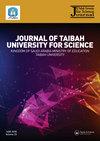Propolis nanoparticles synthesis and characterization with cytotoxic and apoptotic effects on breast cancer cells
IF 2.8
3区 综合性期刊
Q2 MULTIDISCIPLINARY SCIENCES
引用次数: 0
Abstract
The aim of this work was to investigate the antiproliferative and pro-apoptotic effects of propolis on human breast cancer cells using a simple and inexpensive nanoformulation. Various methods were used to characterize the surface and morphology of propolis nanoparticles (NP-Pro), including UV-VIS, FTIR, DLS, and EDX-SEM. The cytotoxic activity of MCF-7, MDA-MB-231 breast cancer cells was measured by XTT technique and compared with healthy cells (MCF-10A). The apoptotic effect of NP-Pro was assessed by flow cytometry using Annexin/PI. The IC50 values of NP-Pro on MCF-7, MDA-MB-231 and MCF-10A cells were 13.67 ± 0.89, 17.89 ± 0.6, 29.9 ± 0.56 µg, respectively. According to these findings, the NP-Pro form we prepared was more cytotoxic on cancer cells than propolis. Cancer cells had much stronger apoptotic activity than healthy cells (p < 0.0001). In this work, NP-Pro was produced through a distinct, straightforward, and low-cost method. In summary, the NP-Pro we synthesized may be a promising potential agent for breast cancer treatment due to its specific cytotoxicity via apoptosis.蜂胶纳米颗粒的合成及其对乳腺癌细胞的细胞毒性和凋亡作用
本文章由计算机程序翻译,如有差异,请以英文原文为准。
求助全文
约1分钟内获得全文
求助全文
来源期刊

Journal of Taibah University for Science
MULTIDISCIPLINARY SCIENCES-
CiteScore
6.60
自引率
6.10%
发文量
102
审稿时长
19 weeks
期刊介绍:
Journal of Taibah University for Science (JTUSCI) is an international scientific journal for the basic sciences. This journal is produced and published by Taibah University, Madinah, Kingdom of Saudi Arabia. The scope of the journal is to publish peer reviewed research papers, short communications, reviews and comments as well as the scientific conference proceedings in a special issue. The emphasis is on biology, geology, chemistry, environmental control, mathematics and statistics, nanotechnology, physics, and related fields of study. The JTUSCI now quarterly publishes four issues (Jan, Apr, Jul and Oct) per year. Submission to the Journal is based on the understanding that the article has not been previously published in any other form and is not considered for publication elsewhere.
 求助内容:
求助内容: 应助结果提醒方式:
应助结果提醒方式:


